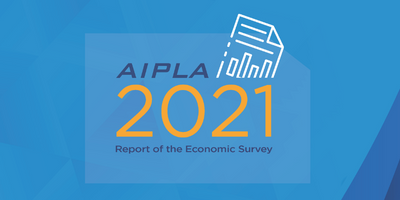Newsstand
Our daily update covering current events.
-
 JOINT STATEMENT ON THE WTO's DECISION
JOINT STATEMENT ON THE WTO's DECISION
June 23, 2022
On June 23, AIPLA, along with the Intellectual Property Owners Association (IPO), Licensing Executives Society International (LESI), Licensing Executives Society USA & Canada, and the New York Intellectual Property Law Association (NYIPLA) issued a joint statement on the tentative the World Trade Organization's (WTO) decision regarding the proposed TRIPs waiver compromise. -
 AIPLA Asks Supreme Court to Address the Role of Transformativeness in the Copyright Fair Use Analysis
AIPLA Asks Supreme Court to Address the Role of Transformativeness in the Copyright Fair Use Analysis
June 20, 2022
AIPLA files a brief in Andy Warhol Foundation for the Visual Arts v. Goldsmith, a case that addresses the role of transformativeness in the copyright fair use analysis. -
 JOINT STATEMENT ON TENTATIVE TRIPS WAIVER COMPROMISE
JOINT STATEMENT ON TENTATIVE TRIPS WAIVER COMPROMISE
March 28, 2022
On March 24, AIPLA, along with the Intellectual Property Owners Association (IPO), Licensing Executives Society International (LESI), Licensing Executives Society USA & Canada, and the New York Intellectual Property Law Association (NYIPLA) issued a joint statement on the tentative TRIPs Waiver Compromise. -
 Supreme Court Vacated and Remanded the Ninth Circuit’s decision in Unicolors, Inc. v. H&M Hennes and Mauritz, LP
Supreme Court Vacated and Remanded the Ninth Circuit’s decision in Unicolors, Inc. v. H&M Hennes and Mauritz, LP
February 24, 2022
On February 24, 2022 the U.S. Supreme Court Vacated and Remanded the Ninth Circuit’s decision in Unicolors, Inc. v. H&M Hennes and Mauritz, LP. This ruling is consistent with the amicus brief filed by AIPLA on August 10, 2021. -
670417cd91a54fe6b61408b343eee15b.png?sfvrsn=fea15870_0) AIPLA Submits Comments to US Copyright Office Pursuant to Notice of Proposed Rulemaking: Copyright Claims Board - Active Proceedings and Evidence
AIPLA Submits Comments to US Copyright Office Pursuant to Notice of Proposed Rulemaking: Copyright Claims Board - Active Proceedings and Evidence
February 10, 2022
On February 7, 2022, AIPLA submitted comments in response to the U.S. Copyright Office Notice of Proposed Rulemaking related to practice procedures before the Copyright Claims Board. AIPLA noted that the success of the CASE Act will turn in significant part on the simplicity and accessibility of the trial procedures. We commended the Office for its efforts to develop user-friendly Copyright Claims Board (“CCB”) procedures. AIPLA offered responses and comments to certain of the questions and rules raised by the Office in the Notice with regard to the management of parties; the management of the proceedings; discovery; evidence; hearings; and, post-determination proceedings. -
 AIPLA Submits Comments to the USPTO in Response to the Notice Regarding Trademarks Administrative Sanctions Process
AIPLA Submits Comments to the USPTO in Response to the Notice Regarding Trademarks Administrative Sanctions Process
February 10, 2022
On February 4, 2022, AIPLA submitted comments to the USPTO on the Request for Comment Regarding Trademarks Administrative Sanctions Process. AIPLA supports the implementation of an administrative sanctions process as proposed by the USPTO but seeks clarification and offers suggestions on a few points in the proposed process. -
 AIPLA Submits Comments to the US Department of Justice on Draft Policy Statement on Licensing Negotiations and Remedies for Standards-Essential Patents Subject to Voluntary F/RAND
AIPLA Submits Comments to the US Department of Justice on Draft Policy Statement on Licensing Negotiations and Remedies for Standards-Essential Patents Subject to Voluntary F/RAND
February 10, 2022
On February 4, 2022, AIPLA submitted comments to the United States Department of Justice on on Draft Policy Statement on Licensing Negotiations and Remedies for Standards-Essential Patents Subject to Voluntary F/RAND. AIPLA recommends the agencies leave the 2019 statement in place, however, provided some suggestions if the 2019 policy does not remain. -
 AIPLA Submits Comments to US Copyright Office Regarding Deferred Registration Examination Study
AIPLA Submits Comments to US Copyright Office Regarding Deferred Registration Examination Study
January 24, 2022
On January 24, 2022, the American Intellectual Property Law Association (AIPLA) submitted comments to the United States Copyright Office pursuant to the Notice of Inquiry related to the deferred registration examination study. The comments address perceived deficiencies in the current registration regime, benefits and drawbacks to offering a deferred examination option, legal or regulatory framework, filing fees, and more. -
 AIPLA Endorses Judge Leonard P. Stark for Circuit Judge of the United States Court of Appeals for the Federal Circuit
AIPLA Endorses Judge Leonard P. Stark for Circuit Judge of the United States Court of Appeals for the Federal Circuit
December 16, 2021
On December 16, 2021, the American Intellectual Property Law Association (AIPLA) submitted a letter to Chair Richard J. Durbin and Ranking Member Charles E. Grassley of the Senate Committee on the Judiciary in support of Judge Leonard P. Stark’s nomination of Circuit Judge of the United States Court of Appeals for the Federal Circuit. The letter outlined the Association’s White Paper (“Recommendations Regarding Nomination of Judges to the United States Court of Appeals for the Federal Circuit” dated September 2018), concluding that Judge Stark not only meets the criteria, but would bring essential experience to the Court. The letter provides an enthusiastic endorsement of Judge Stark, urging the Senate to move forward with his confirmation. -
 AIPLA Submits Joint Letter to House of Representatives Expressing Concern Regarding Resource Appropriation for USPTO
AIPLA Submits Joint Letter to House of Representatives Expressing Concern Regarding Resource Appropriation for USPTO
December 6, 2021
On December 1, 2021, the American Intellectual Property Law Association (AIPLA) and the Intellectual Property Owners Association (IPO) submitted a joint letter to House Committee members Chair DeLauro, Ranking Member Granger, Chair Cartwright, and Ranking Member Aderholt expressing concern regarding resources appropriated to the U.S. Patent and Trademark Office (USPTO) in FY 2022. The joint letter urged the House to pass a funding measure that reflects the intent of the Leahy-Smith America Invents Act to fund the USPTO at a level equal to fee collection estimates. -
 AIPLA Urges Senate to Confirm Katherine (Kathi) Vidal as Under Secretary of Commerce for Intellectual Property and Director of the USPTO
AIPLA Urges Senate to Confirm Katherine (Kathi) Vidal as Under Secretary of Commerce for Intellectual Property and Director of the USPTO
November 30, 2021
On November 30, 2021, the American Intellectual Property Law Association (AIPLA) submitted a letter to Chair Richard J. Durbin and Ranking Member Charles E. Grassley of the Senate Committee on the Judiciary in support of Katherine (Kathi) Vidal’s nomination of Under Secretary of Commerce for Intellectual Property and Director of the United States Patent and Trademark Office (USPTO). The letter outlined components of the set of criteria that AIPLA used to address the needed qualifications for an individual appointed to serve as the leader of the USPTO, concluding that Ms. Vidal possesses such qualifications. -
 AIPLA Submits Comments to U.S. Copyright Office Pursuant to Notice of Proposed Rulemaking Related to CASE Act Regulations
AIPLA Submits Comments to U.S. Copyright Office Pursuant to Notice of Proposed Rulemaking Related to CASE Act Regulations
November 10, 2021
On November 10, 2021, AIPLA submitted comments to the U.S. Copyright Office pursuant to the Notice of Proposed Rulemaking (NPRM) related to CASE Act regulations. Comments provided included support for requiring claimants to provide contact information in the initial notice form and support for charging filing fees for counterclaims. A staggered fee structure was again suggested, and support was provided for an initial notice in a form that includes information required by the statute and additional basic information. An opt-out mechanism for claimants who receive a counterclaim was not supported, and concern was expressed regarding implementation of a mechanism whereby a respondent who has opted out of a CCB proceeding can change their mind and opt back in. -
 The 2021 Report of the Economic Survey is Here!
The 2021 Report of the Economic Survey is Here!
September 22, 2021
The survey examines the economic aspects of intellectual property law practice, including individual billing rates and typical charges for representative IP law services. -
 AIPLA Submits Comments Regarding the Draft Revision to the Chinese Patent Examination Guidelines (Draft for Solicitation of Comments)
AIPLA Submits Comments Regarding the Draft Revision to the Chinese Patent Examination Guidelines (Draft for Solicitation of Comments)
September 21, 2021
On September 21, 2021, AIPLA submitted comments to the China National Intellectual Property Administration (CNIPA) regarding the Draft Revision to the Chinese Patent Examination Guidelines (Draft for Solicitation of Comments). AIPLA provided comments and suggestions on more than fifteen guidelines outlined in a table format for readability. With respect to patent term compensation due to unreasonable delay at the CNIPA, drug patent term extension, and open license, in addition to seeking various classifications, AIPLA submitted a number of suggestions. -
 UNICOLORS, INC., v. H&M HENNES & MAURITZ, L.P., Docket No. 20-915, amicus brief filed 8/10/2021
UNICOLORS, INC., v. H&M HENNES & MAURITZ, L.P., Docket No. 20-915, amicus brief filed 8/10/2021
August 10, 2021
On August 10, 2021, AIPLA filed an amicus brief in the Supreme Court case, Unicolors, Inc., v. H&M Hennes & Mauritz, L.P. (Case No. 20-915). The brief notes that the Ninth Circuit decision in the case increases the risk to copyright owners in that any erroneous legal conclusions set forth in a copyright application may have draconian repercussions, and if upheld, will likely increase the costs and burdens of copyright litigation. Two courses of action are suggested, including reversing the Ninth Circuit’s decision and recognizing the inherent power of district court judges to determine whether an allegation that a registrant has knowingly included inaccurate facts is reasonably plausible before referring a case to the Register of Copyrights. -
 AIPLA Submits Joint Letter Expressing Concern About USPTO Funding in FY 2022
AIPLA Submits Joint Letter Expressing Concern About USPTO Funding in FY 2022
July 29, 2021
On July 29, 2021, the American Intellectual Property Law Association (AIPLA) and the Intellectual Property Owners Association (IPO) submitted a joint letter to Senators Leahy, Shaheen, Tillis, and Moran expressing concern over resources appropriated to the U.S. Patent and Trademark Office (USPTO) in FY 2022. The letter asserted that it is imperative for the USPTO to receive access to all its fees, urging passage of a funding measure that reflects the intent of the Leahy-Smith America Invents Act to fund the USPTO at a level equal to fee collection estimates. -
 EZAKI GLICO CO. v. LOTTE INTERNATIONAL AMERICA CORP., Docket No. 20-1817, amicus brief filed 7/29/2021
EZAKI GLICO CO. v. LOTTE INTERNATIONAL AMERICA CORP., Docket No. 20-1817, amicus brief filed 7/29/2021
July 29, 2021
On July 29, 2021, AIPLA filed an amicus brief in the Supreme Court case, Ezaki Glico Co. v. Lotte International America Corp. (Case No. 20-1817). The brief addresses the Third Circuit’s conclusion that product design trade dress is functional, and therefore not protectable, if it is “useful.” The brief also questions the Third Circuit’s displacement of what remained of the traditional rule with principles of the separate doctrine of aesthetic functionality. Moreover, because trade dress is typically associated with ubiquitous products (especially the trade dress that is copied), it is likely that a trade dress owner would be forced to defend its trade dress in the Third Circuit under the new rule. -
 Supreme Court Rules to Keep the Doctrine of Assignor Estoppel in Minerva v. Hologic
Supreme Court Rules to Keep the Doctrine of Assignor Estoppel in Minerva v. Hologic
June 29, 2021
On June 29, 2021, the U.S. Supreme Court ruled to keep the doctrine of assignor estoppel, but with limits on its application. This ruling is consistent with the amicus brief filed by AIPLA on March 1, 2021. -
 Supreme Court Reverses and Vacates Federal Circuit in United States v. Arthrex, Inc.
Supreme Court Reverses and Vacates Federal Circuit in United States v. Arthrex, Inc.
June 21, 2021
On June 21, 2021, the U.S. Supreme Court reversed and vacated the Federal Circuit decision, dividing 5-4 on the judgment in United States v. Arthrex, Inc. In this majority opinion, the Supreme Court held that the unreviewable authority wielded by Administrative Patent Judges (APJs) during inter partes review is constitutionally incompatible with their appointment by the Secretary of Commerce to an inferior office. -
 AIPLA Endorses Nomination of Tiffany P. Cunningham to the United States Court of Appeals for the Federal Circuit
AIPLA Endorses Nomination of Tiffany P. Cunningham to the United States Court of Appeals for the Federal Circuit
June 15, 2021
On June 15, 2021, AIPLA submitted a letter to the Honorable Richard J. Durbin and the Honorable Charles L. Grassley, Chair and Ranking Member, respectively, of the Committee on the Judiciary. This letter supported the nomination of Tiffany P. Cunningham, President Biden's nominee for Circuit Judge on the United States Court of Appeals for the Federal Circuit. AIPLA wrote that Ms. Cunningham’s background and professional experience demonstrate that she is qualified to serve in that position, and that she would make an excellent addition to the Federal Circuit.
